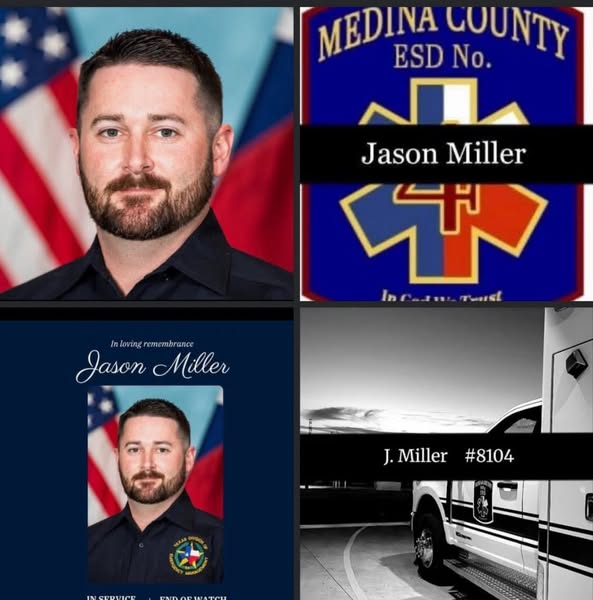The close-knit community of Stockdale, Texas, and the greater emergency medical services (EMS) network across the state are mourning the devastating and deeply personal loss of Chief Jason Miller, the longtime EMS Director for Medina County Emergency Services District 4. On May 19, 2025, Miller died by suicide—an event that has sent shockwaves through first responder circles and brought renewed focus to the immense, often invisible toll that a life of public service can take on those who dedicate themselves to protecting others.
Chief Miller was more than just a title or a badge. He was a mentor, a leader, a protector, and for countless people across the region, a literal lifeline during their most vulnerable moments. His name carried weight not just because of his rank, but because of the example he set through his quiet courage, steadfast leadership, and the deeply human way he approached his profession. For 36 years, Jason Miller walked the line between life and death, showing up in moments of trauma, accident, and illness—not as a bystander, but as the person entrusted with making the difference.
The announcement of his death has been met with grief, shock, and profound sorrow across Texas. The heartbreak is compounded by the manner of his passing: suicide. For many in the EMS and broader first responder community, Miller’s death has reignited conversations about the unrelenting stress, trauma exposure, and mental health challenges that emergency personnel face daily—often without the tools or time to care for themselves in the way they care for others.
Jason Miller began his storied career on April 20, 1989. It was a period of transformation for emergency medicine, with significant advancements in technology, protocol, and public understanding of pre-hospital care. Over the next three and a half decades, Miller adapted, evolved, and rose steadily through the ranks—not simply because of ambition, but because of his tireless dedication to service. His contributions weren’t limited to the administrative sphere. While he certainly earned respect for his strategic leadership, it was his hands-on, roll-up-your-sleeves style that made him a legend among his peers. He didn’t just oversee scenes; he entered them. He didn’t just give orders; he trained, mentored, and inspired.
Colleague Robbie Guerra offered a poignant reflection on Miller’s legacy: “Jason helped mold my career when I started working for Methodist Hospital as a baby medic. Words can’t express the loss that will be felt in our hearts. R.I.P, brother.” Guerra’s words underscore what many in the field have felt over the past few days—a shared sense of loss, of brotherhood interrupted, and of gratitude for a man who made them better, safer, and stronger.
As EMS Director for Medina County ESD 4, Miller bore the weight of leadership in a jurisdiction where every second counts. Emergency services directors operate in an incredibly high-stakes environment. They’re responsible not just for life-saving responses, but for budget planning, personnel development, equipment logistics, interagency coordination, disaster response preparation, and community outreach. It is a role that demands not only technical knowledge and tactical agility, but unshakable emotional resilience. And for 36 years, Jason Miller shouldered those responsibilities with the same grace he showed in the field.
But behind the professionalism, the accolades, and the responsibility lay the profound human cost of his service. Emergency medical responders routinely witness death, injury, and suffering. They make split-second decisions that can save lives or, sometimes, result in unavoidable loss. They absorb the trauma of strangers. They manage grief-stricken families. They comfort the dying. And they do it all while navigating long hours, shifting schedules, and a chronic shortage of mental health resources.
Jason Miller did this for more than three decades.
It is often said that EMS professionals are the first to arrive and the last to leave. In that spirit, Miller lived a life defined by self-sacrifice. Yet the burden of always being “the strong one” can be isolating. The people who carry others through crisis often hide their own pain—sometimes too well. As much as he was admired for his strength, Miller was still a man with a heart that carried more than most will ever understand.
To those who knew him best, he was not just Chief Miller but Jason—a man of deep conviction, humility, and love. Friends and family describe a man who loved fiercely, who valued loyalty, who approached life with intensity, and who expected from others the same level of integrity he demanded of himself. He held his department together not with an iron fist but with quiet consistency and a belief in purpose.
On May 23, 2025, at 10:00 a.m., loved ones will gather at Grace Bible Church in La Vernia, Texas, to honor the man they cherished. The church, located at 390 FM 1346 S, is expected to be filled with fellow EMS professionals, fire and police personnel, hospital workers, neighbors, and grateful members of the community he served. Following the service, Jason will be laid to rest at Kosciusko Cemetery—a solemn farewell to a man whose life was anything but ordinary.
These services will offer a much-needed space for remembrance, but they will also be an emotionally charged reminder of the need for systemic change. In the wake of Miller’s death, conversations are emerging not only around honoring his legacy but also around addressing the critical issue of mental health support for EMS professionals. Across the country, first responders are dying by suicide at alarming rates. The pressures of the job, compounded by a culture that often stigmatizes emotional vulnerability, have created a silent crisis.
Jason Miller’s death forces us to ask difficult questions: How many other EMS directors, paramedics, and firefighters are silently battling the weight of their service? What supports do they truly have? What could have been done to help Jason carry a burden that ultimately became too heavy?
The National Suicide & Crisis Lifeline—accessible through dialing 988—is one such resource. It offers trained crisis counselors 24/7, a vital tool for anyone in distress. But beyond crisis intervention, the EMS community needs proactive wellness programs, peer support networks, mandatory mental health debriefings, and a cultural shift that allows vulnerability without judgment. The institutions that rely on heroes like Jason Miller must also commit to protecting their emotional well-being.
It is perhaps ironic and tragic that a man who spent so much of his life saving others ultimately couldn’t find a path to save himself. But this does not lessen his legacy. Rather, it sharpens our view of the immense pressure he endured and deepens our respect for the strength he showed every day he chose to keep going.
In mourning Jason Miller, we are reminded of the unseen toll of service. But we are also reminded of the beauty of a life lived in unwavering dedication to others. He taught, he mentored, he responded, and he sacrificed. And while his end came too soon, his impact remains etched in the hearts of those who knew him, worked with him, and were saved by him.
Chief Miller’s legacy is not defined by the manner of his death but by the depth of his life. Thirty-six years in EMS is more than a career—it’s a testament to a man who chose every day to run toward the cries for help that others run from. That kind of service, that kind of bravery, doesn’t fade with death. It lives on in the stories, the lessons, and the lives he touched.
As the final tones sound at the May 23 funeral, and as the radios go silent in his honor, Jason Miller’s watch will formally end. But the echoes of his leadership, his kindness, and his courage will continue to ripple outward. He is gone, but he is not forgotten.
To those still struggling in silence: you are not alone. There is help. There is hope.
Rest in peace, Chief Jason Miller. Your burden is lifted. Your legacy endures.


Leave a Reply